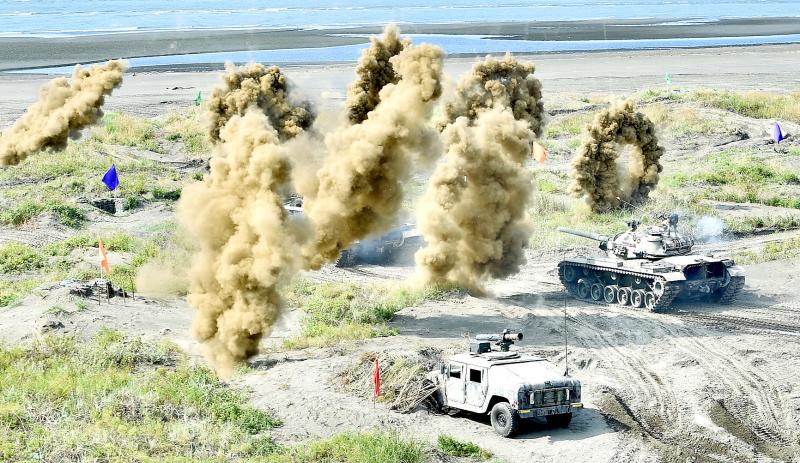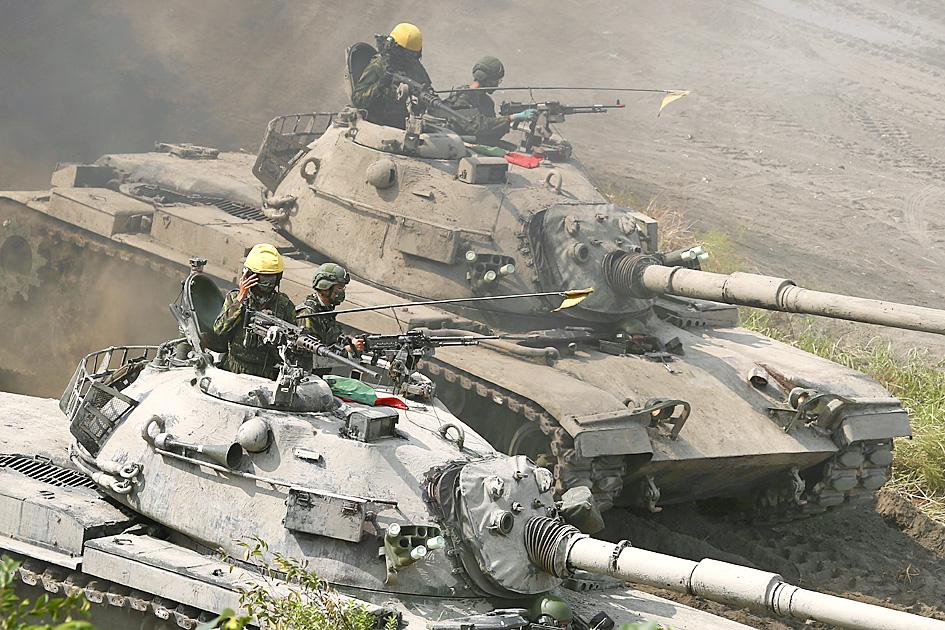The government yesterday proposed extra defense spending of NT$240 billion (US$8.66 billion) over the next five years, including on new missiles, as it warned of an urgent need to upgrade weapons in the face of “severe threats” from China.
President Tsai Ing-wen (蔡英文) has made modernizing the armed forces and increasing defense spending a priority, especially as Beijing ramps up military and diplomatic pressure against the nation.
The money, which comes on top of planned military spending of NT$471.7 billion for next year, would need to be approved by the Legislative Yuan, where Tsai’s ruling Democratic Progressive Party has a large majority, meaning its passage should be smooth.

Photo: Peter Lo, Taipei Times
“The Chinese communists have continued to invest heavily in national defense budgets, its military strength has grown rapidly, and it has frequently dispatched aircraft and ships to invade and harass our seas and airspace,” the Ministry of National Defense said in a statement after a weekly Cabinet meeting.
“In the face of severe threats from the enemy, the nation’s military is engaged in military building and preparation work, and it is urgent to obtain mature and rapid mass production weapons and equipment in a short period of time,” it added.
Deputy Minister of National Defense Wang Shin-lung (王信龍) said the new weapons would be made domestically, as the nation boosts its production prowess, although the US would probably remain an important parts and technology provider.

Photo: Ritchie B. Tongo, EPA-EFE
Taiwan has been keen to demonstrate that it can defend itself, especially amid questions about whether the US would come to its aid if China attacked.
Premier Su Tseng-chang (蘇貞昌) said during the Cabinet meeting that there was great need to augment the military’s combat capabilities, especially for the naval and air force branches.
The special budget has prioritized domestically produced armaments, which could lead to increased corporate investment in the national defense supply chain, creating a win-win scenario for boosting economic growth and autonomous national defense production capabilities, Su said.
The weapons it aims to buy include cruise missiles and warships, the ministry said.
Eight categories of missiles are to be built domestically as part of the budget, Wang said.
They include coastal anti-surface missile systems; the Antelope air defense system; the Tien Kung III (Sky Bow III) land-based surface-to-air missile; an attack drone system; the Wan Chien (Thousand Swords) missile system and the Hsiung Feng IIE (Brave Wind) missile system, he said.
The special budget also calls for the installation of combat systems on Coast Guard Administration ships and continuing the Indigenous Shipbuilding Program, he added.
All items are considered critical if the military is to rapidly build up its combat capabilities, Wang said.
The ministry would provide more details on each item during a budget review, he added.
The announcement came as Taiwan is in the middle of its annual Han Kuang military exercises, which began on Monday and are to end today.
The army yesterday simulated fending off an invasion, firing artillery from a beach on the southern coast.
The exercises, Taiwan’s major war games, have been held annually since 1984, in the form of live-fire drills and computerized war games, to test the military’s combat readiness in the face of a possible Chinese invasion.
Additional reporting by CNA

Auckland rang in 2026 with a downtown fireworks display launched from New Zealand’s tallest structure, Sky Tower, making it the first major city to greet the new year at a celebration dampened by rain, while crowds in Taipei braved the elements to watch Taipei 101’s display. South Pacific countries are the first to bid farewell to 2025. Clocks struck midnight in Auckland, with a population of 1.7 million, 18 hours before the famous ball was to drop in New York’s Times Square. The five-minute display involved 3,500 fireworks launched from the 240m Sky Tower. Smaller community events were canceled across New Zealand’s

The Ministry of Foreign Affairs (MOFA) yesterday said it is closely monitoring developments in Venezuela, and would continue to cooperate with democratic allies and work together for regional and global security, stability, and prosperity. The remarks came after the US on Saturday launched a series of airstrikes in Venezuela and kidnapped Venezuelan President Nicolas Maduro, who was later flown to New York along with his wife. The pair face US charges related to drug trafficking and alleged cooperation with gangs designated as terrorist organizations. Maduro has denied the allegations. The ministry said that it is closely monitoring the political and economic situation

‘SLICING METHOD’: In the event of a blockade, the China Coast Guard would intercept Taiwanese ships while its navy would seek to deter foreign intervention China’s military drills around Taiwan this week signaled potential strategies to cut the nation off from energy supplies and foreign military assistance, a US think tank report said. The Chinese People’s Liberation Army (PLA) conducted what it called “Justice Mission 2025” exercises from Monday to Tuesday in five maritime zones and airspace around Taiwan, calling them a warning to “Taiwanese independence” forces. In a report released on Wednesday, the Institute for the Study of War said the exercises effectively simulated blocking shipping routes to major port cities, including Kaohsiung, Keelung and Hualien. Taiwan would be highly vulnerable under such a blockade, because it

UNRELENTING: China attempted cyberattacks on Taiwan’s critical infrastructure 2.63 million times per day last year, up from 1.23 million in 2023, the NSB said China’s cyberarmy has long engaged in cyberattacks against Taiwan’s critical infrastructure, employing diverse and evolving tactics, the National Security Bureau (NSB) said yesterday, adding that cyberattacks on critical energy infrastructure last year increased 10-fold compared with the previous year. The NSB yesterday released a report titled Analysis on China’s Cyber Threats to Taiwan’s Critical Infrastructure in 2025, outlining the number of cyberattacks, major tactics and hacker groups. Taiwan’s national intelligence community identified a large number of cybersecurity incidents last year, the bureau said in a statement. China’s cyberarmy last year launched an average of 2.63 million intrusion attempts per day targeting Taiwan’s critical